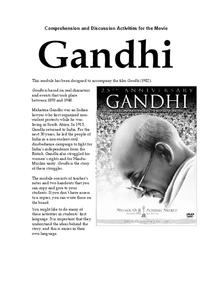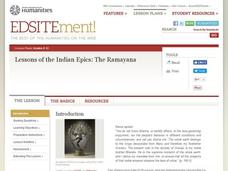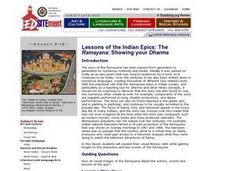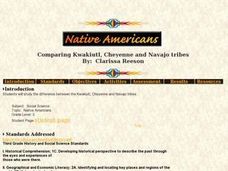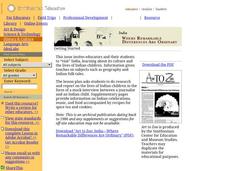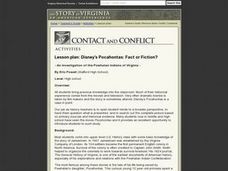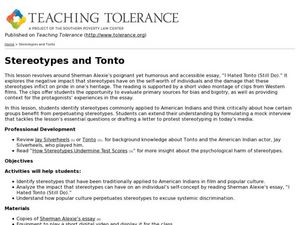Curriculum Project
Gandhi
Introduce class members to Gandhi's non-violent, non-cooperative ideas with Richard Attenborough's 1982 bio-epic. The film traces the experiences that gave shape to Gandhi's ideas and the actions that eventually lead to the end of...
Curated OER
Lessons of the Indian Epics: The Ramayana
Students read a version of Ramayana and explore the elements of the epic hero cycle. In this Ramayana analysis lesson, students retell the basic narrative of the Ramayana and identify the main characters. Students identify elements of...
Curated OER
American Indians, European Settlers, and Colonial Arkansas
Students identify the interdependence among various ethnic groups in early Arkansas history. They illustrate timelines and visit historic sites. They make maps of the site and give class presentations.
Roy Rosenzweig Center for History and New Media
The Boston Massacre: You Be the Judge!
The importance of considering multiple perspectives of the same event is the big idea in this exercise that focuses on the Boston Massacre. Class groups examine photos of four depictions of the massacre, an English and an American...
Curated OER
The Ramayana: Showing your Dharma
High schoolers identify characters and events from the Ramayana. They discuss ways in whcih the images convey non-verbal information and messages. They discuss similarities and differences in the visual and verbal tellings of the Ramayana.
Curated OER
What Did it Look Like When Europe Met America?
Students view the film 'Black Robe,' which further develop students' abilities to see an event or era of history from multiple perspectives. After the movie, they utilize worksheets imbedded in this plan to write about what they've seen.
Curated OER
Comparing Kwakiutl, Cheyenne and Navajo tribes
Third graders study the difference between the Kwakiutl, Cheyenne and Navajo tribes. They identify the people, resources, lifestyle and beliefs of the Kwakiutl, Cheyenne, and Navajo Indians. Afterward, they present their projects on each...
Curated OER
Bollywood, Philadelphia
Students conceive a simple boy-meets-girl story. They write a screenplay, compose a storyboard, and produce the story with music and dancing in the style of a modern Indian operetta, using digital filming and editing. They screen the...
Curated OER
India: Where Remarkable Differences Are Ordinary
Students research India and Indian culture. In this Indian research lesson plan, students research and report on the lives of Indian children. The report will be in the form of a mock interview between a journalist and an Indian child....
National Woman's History Museum
Red Power Prevails : The Activism, Spirit, and Resistance of Native American Women
Native American women powered the American Indian Movement and other social changes, but they are often forgotten by history books. Examining a series of resources, including a documentary film, photographs, secondary sources, and social...
Curated OER
An Eye for an Eye
Pupils watch a view introducing them to modern Indian History. During the film, they answer discussion quesitons and discover the concept of non-violent civil disobedience. They share their responses with the class and write an essay to...
Curated OER
Disney's Pocahontas: Fact or Fiction?
Did you know that Pocahontas was 12 when Jamestown was established? Did you know that she later married John Rolfe? Did you know that she lived in London for two years? Did you know that she died of small pox? Class members study the...
Curated OER
Native Americans - Searching for Knowledge and Understanding
What do you know about American Indians? Upper graders compose an informational essay based on the research they conduct. They choose a Native American group to study and, using the provided list of web links, gather information and...
Global Oneness Project
A Day in the Life
We often see other countries depicted in movies, but getting a close look at a typical day in the life of a young person from another country isn't as common. Give your pupils such a look with a resource that helps class members explore,...
Curated OER
Stereotypes and Tonto
Students identify stereotypes, especially those applied to American Indians. In this teaching tolerance lesson, students read an essay entitled " I Hated Tonto (Still Do)" and discuss the negative impact that stereotypes may have on a...
Curated OER
Tribal Diversity within the Indigenous Peoples of the North American Continent
Students, after brainstorming what they already know about Indians, explore and analyze the tribal diversity within the Indigenous Peoples of North America. They recognize that American Indians have their own unique language origins,...
Curated OER
Native American Interdisciplinary Educational Unit
Students research various Native American stories and legends. They participate in reader's theater, write original legends, cook Native American foods, construct dioramas and view Native American art and artifacts.
Curated OER
Teaching the Hindu-Buddhist Tradition in East Asian Culture Through Asian Literature and Film
Students explore various intellectual traditions which dominate human history through a variety of contemporary pieces of literature which exemplify the traditions. Biblical monotheism, Greek rationalism, Hinduism, Buddhism, Confucianism...
Curated OER
Gandhi's Salt March, A Simulation
Pupils examine Gandhi's Salt March. In this peace and tolerance lesson, students discuss the Salt Tax Levy that was imposed in India. Pupils then debate how the Indian National Congress should have handled the issue.
Curated OER
Myths of the Wild West
Students examine the Wild West as it was depicted in films and books. In groups, they compare this information to what it was really like as they find out in books. They also discover the role of the Native Americans in the Wild West...
Curated OER
Cultural Vantage Points
Eighth graders investigate the history of Beaverhead County and Big Hole Valley. They focus on the Native American people groups of the immediate area. Students read about the journey of Lewis and Clark to create historical context. Then...
Curated OER
Boomtown
High schoolers view a series of films that explore evolving concepts of civil rights in America. They consider the civil rights of African-Americans, the aged and homosexuals. They discuss the films and complete worksheets.
Curated OER
Aboriginal Statistics
Fourth graders analyze statistics of Native Americans by creating graphs. In this data analysis lesson, 4th graders define different statistical terms and practice finding those statistics from groups of numerical information about...
Curated OER
Crossing the Color Line
High schoolers watch the series "Unforgiveable Blackness". They analyze Jack Johnson's life to investigate the legal system and interracial relationships. They examine how segregation was threatened by peole allowing to marry ones out of...


